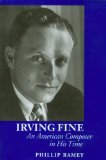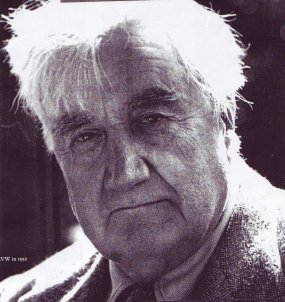Classical Music Review: Cantata Singers
Laudably, the Cantata Singers music director David Hoose, now in his 28th year at the helm, has chosen to bring forward works not often played, of which there were two on this month’s program. Three other composers were also represented during the evening.
By Caldwell Titcomb.
In the first major concert by the Cantata Singers this year (presented twice on November 5 and 6 in Jordan Hall), the company continued its recent practice of placing special focus on a single composer. Having done so with Kurt Weill, Benjamin Britten, and Heinrich Schütz, it has settled this season on Ralph Vaughan Williams (1872–1958), a titan among English composers.
Laudably, music director David Hoose, now in his 28th year at the helm, has chosen to bring forward works not often played, of which there were two on this month’s program. Three other composers were also represented during the evening.
The concert opened with “On the Beach at Night” (1949) by the late Andrew Imbrie (1921–2007). A professor at Berkeley from 1960, he became known hereabouts during a year as visiting professor at Brandeis. “On the Beach” is a rather dissonant setting for chorus and string orchestra with a text by Walt Whitman (which Vaughan Williams had also set in his 1909 “Sea Symphony”). Imbrie starts on a low E, to which he returns at the end after a substantial journey that produces a feeling of mystery.
The first Vaughan Williams work was “Flos Campi” (1925), a fascinating but strange undertaking. The title refers to the Rose of Sharon in the “Song of Solomon.” The scoring is for a viola soloist, single woodwind and brass, harp, percussion, and strings. The composer prefaced the six continuous movements with the Latin quotations that inspired them from the Latin Vulgate Bible along with English translations. The chorus, however, does not sing these texts but instead voices its parts wordlessly while the audience is supposed to read the words. The unusual sonorities are carefully calibrated, and William Frampton, playing throughout from memory, beautifully executed the ruminative viola writing.
After intermission came the premiere of “Give Thanks for All Things” by Pulitzer-winning Yehudi Wyner (b. 1929), who recently retired from 14 years as a Brandeis professor. This long piece, nearly 40 minutes, is the 12th work commissioned by the Cantata Singers over the years. Wyner originally intended to write a “comic cantata” but ended up dealing extensively with death. He drew his text from a host of sources: Psalms 148 and 150, an anonymous prayer, a poem by Richard Wilbur, some ancient words of Dionysius Cato, an excerpt from Shakespeare’s Measure for Measure, and Whitman’s “Dirge for Two Veterans.” This is a highly rhythmic piece. Especially effective was the “Dirge,” which contained passages for baritone, soprano, and alto soloists. One wondered, though, at the wisdom of calling for two bulky timpani and then writing just a couple of taps on them.
The singers got a chance to rest as the program then turned to Vaughan Williams’ Concerto for Oboe and Strings (1944). The marvelous soloist was Peggy Pearson, who, with the Boston Symphony’s John Ferrillo, is one of our area’s two most accomplished masters of this difficult instrument. There are three movements: a Rondo Pastorale, a Minuet & Musette, and a virtuosic Scherzo Finale. The work is officially labeled as in the key of A minor, which really applies only to the first movement. The concerto ends in the key of G major, with the oboe sounding a lovely high D.
 The concert ended with “The Choral New Yorker” (1944) by the local composer Irving Fine (1914–62), who built up and headed the School of Creative Arts at Brandeis until his awful early death. Fine was one of the great masters of choral writing in the last century. With four poems drawn from The New Yorker magazine, the work had its premiere done in Sanders Theatre by Harvard and Radcliffe singers with Fine himself at the piano. This time conductor Hoose was inspired to orchestrate the piano original, and the result was absolutely delightful and ought to see more mileage. The last number, “Design for October,” lamenting that “Summer is gone,” is one of the most gorgeous stretches of music in the choral repertory. Those interested in this masterly composer should consult the excellent, prize-winning biography by Phillip Ramey.
The concert ended with “The Choral New Yorker” (1944) by the local composer Irving Fine (1914–62), who built up and headed the School of Creative Arts at Brandeis until his awful early death. Fine was one of the great masters of choral writing in the last century. With four poems drawn from The New Yorker magazine, the work had its premiere done in Sanders Theatre by Harvard and Radcliffe singers with Fine himself at the piano. This time conductor Hoose was inspired to orchestrate the piano original, and the result was absolutely delightful and ought to see more mileage. The last number, “Design for October,” lamenting that “Summer is gone,” is one of the most gorgeous stretches of music in the choral repertory. Those interested in this masterly composer should consult the excellent, prize-winning biography by Phillip Ramey.
The Cantata Singers’ next program, on January 14, will have music by Holst, Elgar, and Finzi, along with three works by Vaughan Willliams including his wonderful one-act opera Riders to the Sea. Attendance also gets you an impressive and lavish 116-page program book crammed full of useful information.

